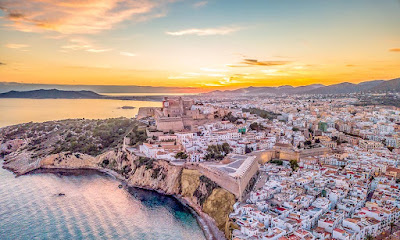The rise of Valossa begins with its capital and largest settlement, the city of Porto Libre. It didn't take long for sailors in the Great South Sea to note that the southern shore of Valossa's main island made for an ideal site to moor their ships - it was close enough to the mainland to make travel easy, but not so close as to fall under the influence of any meddlesome bureaucrats, and its proximity to Taldameer, Golnir, the City-States, and Quel'Ahma meant that it was equally accessible to all the region's naval powers. Over time, traders from all these lands began to settle in the area, which grew and grew into a city in its own right. But the appeal of a city away from the reach of the crowned heads of the mainland inevitably drew attention from those with less savory interests - and Porto Libre became infamous as a haven of pirates, thieves, and cutthroats, where no merchants could be trusted to give an honest deal and one could expect a knife in the back if they made a wrong turn.
Despite such rumors, the city actually managed to conduct itself reasonably well, and stayed its course through the years. But among so-called civilized society, the perception of Valossa was a land fit only for rogues and criminals - which meant that it was often a destination for exiles. This, ironically, was what allowed it to become a power in its own right.
The man regarded as the father of Valossa, Mauregato Drac, was a fearsome pirate who, two hundred years ago, during the reign of Emperor Alberich II, was exiled from Taldameer and shipped off to Valossa, where it was thought the rabble would sort him out. To everyone's surprise, though, the captain pulled off a few miracles.
For one, he managed to unite the pirates of Porto Libre under his banner and turn them against Taldameer, establishing a fleet that laid waste to ports along the Great South Sea. The navies of Taldameer and Fiora quickly launched retaliatory forces to crush the rebellion in its tracks, expecting a swift victory over what they perceived to be a bunch of disorganized thugs. But that was when the second miracle happened - as luck would have it, Porto Libre was built on a naturally defensible harbor, and few of the heavy galleons Taldameer had deployed could enter the tight quarters of the port at a time, allowing the ships to easily be picked off.
The war dragged on far longer than anyone had ever prepared for, and in the end, Taldameer sued for peace, offering to withdraw its forces and grant Drac the title of Doge. And despite many expecting it to fall apart within a few years, the newly pronounced Free City of Porto Libre thrived, with the new Doge putting no shortage of effort into cleaning up the city's image and transforming it into an economic powerhouse, welcoming ships from all ports and enriching his coffers through the trade such arrangements brought.
For years, however, Porto Libre remained a free city, with the authority of the Doge not extending beyond its walls. Within the last century, that changed - when Martinho Drac, a descendant of Mauregato, was elected to the position of Doge, he fed his delusions of grandeur and, citing his celebrated heritage, declared himself King of a new Kingdom of Valossa, intending to unite the islands under his control. It took several years, and proved controversial even among locals, but the work paid off, with forces from Porto Libre conquering the formerly isolated towns of the isles and driving out foreign ports. The Kingdom would prove short-lived, however, and after the disastrous reign of King Ciriaco I and the subsequent succession crises, the decision was made for Valossa to once again become a republic, though retaining the territory taken under the Kingdom.
Today, Valossa is under the reign of Dogaressa Marilisa Margarita, elected from a council of noble families with prominent seats in the capital. The streets of Porto Libre are colorful, cosmopolitan, and bustling with activity, influenced as much by the cultures indigenous to the islands as by that of Taldameer, and beyond the reaches of noble haciendas, there have been many isolated frontier settlements established inland, particularly following the discovery of rich veins of gold in the northern mountains.It is a land still in transition, and a land still feeling out the influence it can exert over its newfound territories. It is a land with a reputation for danger...but a land with a reputation for fortunes to be won as well.



No comments:
Post a Comment